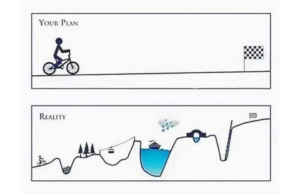At some point during the training process someone always asks me, “How long will it take to train my puppy?” This is a common question. The answer isn’t simple because there is no specific timeline where a puppy will learn A, B, and C in X, Y, Z timeframe. Let’s explore the factors that go into training and look at that burning question of ‘how long does it take to train a puppy’?
Breaking Down Puppy Training
1) Individual Learning Styles and Progress:
Just like humans, each puppy has a unique personality and learning pace. While all puppies follow the learning principles of association and consequence, their ability to acquire skills may differ. Some may excel in certain areas while needing more time and guidance in others. Tailoring your training approach to your puppy’s specific needs is crucial.
2) Skill Acquisition and Fluency:
Training is more than teaching a new skill; it’s about developing fluency. Achieving fluency requires repeated practice and reinforcement in various contexts and environments. Give your puppy time to understand the skill, generalize it to different situations, and perform it reliably. Patience and consistency are vital.
3) Distractions and Impediments:
Real-world training involves dealing with distractions that can hinder progress. Puppies are naturally curious and easily distracted, making training more challenging. Gradually introducing distractions and teaching your puppy to focus on skills despite distractions takes time. Adjust your training expectations and gradually increase difficulty at your puppy’s pace- not yours.
4) Working at Your Puppy’s Level and Pace:
Effective training means working within your puppy’s abilities and going at their pace. Pushing beyond their capabilities leads to frustration and setbacks. Puppies don’t adhere to our unreasonable timetables; they need consistent guidance and understanding. Customize training sessions to match your puppy’s attention span, gradually increasing duration and difficulty as they mature and start to understand EACH skill you want them to learn.
5) Lifelong Training:
While the first year is crucial for foundational skills, adolescence brings developmental changes that may require a training refresher. Reinforce earlier skills and address new challenges during this phase. Training is an ongoing process throughout your dog’s life.
6) Time and Effort Investment:
If you desire a well-mannered puppy, it requires an investment of time and effort on your part. Full stop. Wishing won’t make skills magically appear. Consistent training, positive reinforcement, and patient guidance are essential for achieving desired behaviors.
7) Hundreds of Repetitions for Solid Behavior:
Solidifying behaviors in a puppy’s repertoire requires hundreds of repetitions. Consistency and repetition build strong neural connections and muscle memory. Each successful repetition reinforces the desired behavior, increasing its occurrence. Embrace the journey and invest the time and effort for consistent and reliable behaviors.
8) Reasonable Expectations:
Setting reasonable expectations throughout training is crucial. Remember that puppies are still learning and growing, unable to perform complex tasks immediately. Celebrate progress, no matter how small, and focus on building a strong foundation. Realistic expectations prevent frustration and allow your puppy to flourish at their own pace.
9) Training isn’t linear:
It’s important to recognize that training is not a linear process. Expect bumps in the road and setbacks along the way. Puppies, like us, have both good and bad days, and their behavior can fluctuate. Therefore, being prepared for moments of regression and training plateaus is crucial. It sets you and your puppy up for success by managing expectations and preventing disappointment.
10) Avoid Blaming the Puppy:
First and foremost, it’s crucial to acknowledge your role in your puppy’s training journey. Instead of blaming the puppy for untaught skills, we should recognize that training is our responsibility. It demands the adjustment of methods and dedicated time and effort.
Moreover, here’s the great news: you don’t have to spend hours each day training your puppy. By working in short increments of 2-5 minutes, several times each day, you can establish a solid training plan. The key is consistency.
It’s time to get real!
Now, here is the moment of truth… the part that we as humans don’t want to hear…
You can’t get mad at your puppy for the things you didn’t train.
That’s the cold, hard truth that we have to face. We need to be honest about what we put the time in to train and what we didn’t.
Just because you taught your puppy to run to you from another room or from 10 feet away in the backyard doesn’t mean they will be able to reliably come to you when they are watching a squirrel in the tree.
Just because your puppy walks nicely in your neighborhood when it’s quiet doesn’t mean your puppy will be able to walk nicely at the food truck festival or while you are at the park or on a trail.
These behaviors don’t automatically translate to different environments. Your puppy has to practice and practice for a variety of scenarios and continue to perfect those skills. It’s the only way they will be able to do the degree of difficulty you are asking in the different environments you want the skills to work.
By the same token, if you have not invested the time to work on polite greetings and help your puppy understand what to do when they meet someone, you cannot get upset when they enthusiastically greet someone and jump up to say hello.
So, what is a realistic timeframe for how long it will take to train your puppy?
Training a puppy is an ongoing process that requires time, patience, and consistency. It’s important to remember that puppies don’t come preprogrammed with skills. Merely wishing for them to possess certain abilities won’t make it happen. To ensure our puppies can perform desired behaviors, we must invest the necessary time to teach them.
Firstly, it’s crucial to plan on training throughout the first year of owning a puppy. While this might initially seem overwhelming, the focus will primarily be on helping the puppy acquire new skills in the beginning and then progressively enhancing and maintaining those skills over time. Essentially, this means allocating more training time during the initial stages to establish a solid foundation, which will yield long-term benefits in the future.
A final word on puppy training
Approach training with a realistic mindset, understand your puppy’s individual learning styles and abilities. Embrace the journey, celebrate milestones, and witness your puppy grow through the power of training.
Puppy training more than you bargained for? It’s ok, you’re not the only one! Yes, I could use help with this whole puppy raising and training thing.












